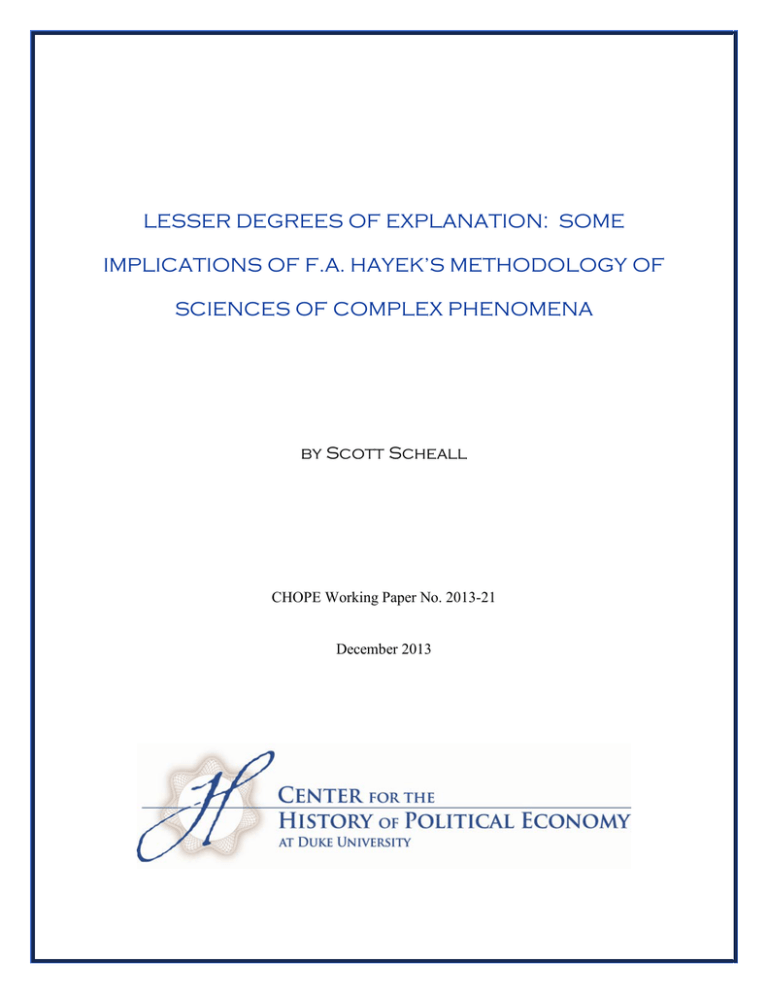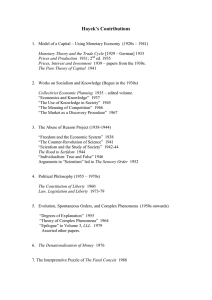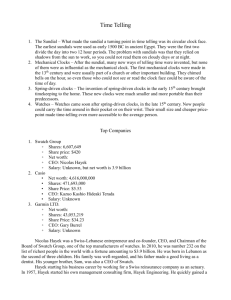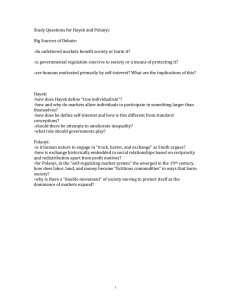LESSER DEGREES OF EXPLANATION: SOME SCIENCES OF COMPLEX PHENOMENA
advertisement

LESSER DEGREES OF EXPLANATION: SOME IMPLICATIONS OF F.A. HAYEK’S METHODOLOGY OF SCIENCES OF COMPLEX PHENOMENA by Scott Scheall CHOPE Working Paper No. 2013-21 December 2013 Lesser Degrees of Explanation: Some Implications of F.A. Hayek’s Methodology of Sciences of Complex Phenomena Scott Scheall Draft as of 12/28/2013 Abstract: From the early-1950s on, F.A. Hayek was concerned with the development of a methodology of sciences that study systems of complex phenomena. Hayek argued that the knowledge that can be acquired about such systems is, in virtue of their complexity (and the comparatively narrow boundaries of human cognitive faculties), relatively limited. The paper aims to elucidate the implications of Hayek’s methodology with respect to the specific dimensions along which the scientist’s knowledge of some complex phenomena may be limited. Hayek’s fallibilism was an essential (if not always explicit) aspect of his arguments against the defenders of both socialism ([1935] 1948, [1940] 1948) and countercyclical monetary policy ([1975] 1978); yet, despite the fact that his conceptions of both complex phenomena and the methodology appropriate to their investigation imply that ignorance might beset the scientist in multiple respects, he never explicated all of these consequences. The specificity of a scientific prediction depends on the extent of the scientist’s knowledge concerning the phenomena under investigation. The paper offers an account of the considerations that determine the extent to which a theory’s implications prohibit the occurrence of particular events in the relevant domain. This theory of “predictive degree” both expresses and – as the phenomena of scientific prediction are themselves complex in Hayek’s sense – exemplifies the intuition that the specificity of a scientific prediction depends on the relevant knowledge available. JEL Codes: B2, B25, B3, B31, B4, B41 Keywords: Hayek, Economic Methodology, Fallibilism, Complexity, Explanation, Prediction, Underdetermination, Quine 1 Lesser Degrees of Explanation: Some Implications of F.A. Hayek’s Methodology of Sciences of Complex Phenomena Scott Scheall Draft as of 12/28/2013 From the early-1950s on, F.A. Hayek was, among his several other interests, concerned with the development of a methodology of sciences that study systems of phenomena that are complex 1 in the sense of consisting of a large number of elements interconnected (both to each other and to the external environment) in such a way as to give rise to an emergent order that possesses “certain general or abstract features which will recur independently of the particular values of the individual data, so long as the general structure…is preserved” (Hayek [1964a] 1967, 26). 2 The scientist of complex phenomena investigates these orders and their properties, irreducible to the properties of the particular elements involved. However, the knowledge that can be acquired about such orders is, in virtue of their complexity (and the comparatively narrow boundaries of human cognitive faculties), limited as compared to the knowledge that scientists of simpler phenomena can acquire about the objects of their analyses. In particular, Hayek (Ibid., 27) argued that the number of elements of such complex systems is so large as to constrain the capacity of the scientist of complex phenomena to populate theoretical models with data sufficient to generate any but circumscribed explanations (“explanations of the principle”) and 1 The various scientific disciplines that Hayek counted under this heading include theoretical psychology (1952a), “cybernetics, the theory of automata or machines, general systems theory, and perhaps also communications theory” ([1955] 1967, 20); as well as economics, linguistics (1967, 72), geology, evolutionary biology, and the branches of astrophysics that investigate the formation of stars and galaxies (Ibid., 76). 2 Fiori (2009) argues that, with respect to the two elements of Hayek’s definition of complexity, i.e., the number of elements and the connections between them, it is the former that Hayek usually emphasized over the latter; indeed, according to Fiori, Hayek occasionally ignored altogether the matter of interconnections as a property of complex phenomena. Be this as it may, the notion of complexity considered in the present paper encompasses both aspects of Hayek’s definition. 2 Lesser Degrees of Explanation: Some Implications of F.A. Hayek’s Methodology of Sciences of Complex Phenomena Scott Scheall Draft as of 12/28/2013 predictions (“pattern predictions”). 3 The present paper aims to draw out and clarify a number of heretofore unspecified implications of Hayek’s methodology of sciences of complex phenomena. In particular, the paper seeks to elucidate the implications of Hayek’s methodology with respect to the specific dimensions along which the scientist’s knowledge of some complex phenomena may be limited. Hayek’s fallibilism was an essential (if not always explicit) aspect of his arguments against the defenders of both socialism ([1935] 1948, [1940] 1948) and countercyclical monetary policy ([1975] 1978); yet, despite the fact that his conceptions of both complex phenomena and the methodology appropriate to their investigation imply that ignorance might beset the scientist in respects beyond the aforementioned difficulties of data collection, he never explicated all of these consequences. Predictive capacities are limited wherever such ignorance is rife. More to the point, the specificity of a scientific prediction depends on the extent of the relevant scientist’s (or scientific community’s) knowledge concerning the phenomena under investigation. The paper offers an account of the considerations that determine the extent to which a theory’s implications prohibit the occurrence of particular events in the relevant domain. This theory of “predictive degree” both expresses and – as the phenomena of scientific prediction are themselves complex in Hayek’s sense – exemplifies the intuition that the specificity of a scientific prediction depends on the relevant knowledge available. The concluding section considers Hayek’s claim that pattern predictions are falsifiable 3 Hayek ([1955] 1967, 9n) understood explanation and prediction to be two sides of the same coin. The two terms are used interchangeably here. 3 Lesser Degrees of Explanation: Some Implications of F.A. Hayek’s Methodology of Sciences of Complex Phenomena Scott Scheall Draft as of 12/28/2013 and, in particular, the question of whether Hayek’s epistemology implies a holistic approach to predictive testing that saves the claim of falsifiability from the problems of underdetermination. 4 I. According to Hayek’s epistemology, knowledge comes in two varieties: there is “scientific” (or “theoretical”) knowledge (“knowledge of general rules”) and there is empirical knowledge (“knowledge of the particular circumstances of time and place”) (Hayek [1945] 1948, 80). 5 The possibility of a “full explanation” or a “precise prediction of particular events” 6 requires that the scientist possess both kinds of knowledge to a sufficient extent: “[s]uch prediction will be possible if we can ascertain…all the circumstances which influence those events. We need for this both a theory which tells us on what circumstances the events in question will depend, and information on the particular circumstances which may influence the event in which we are interested” (Hayek [1961] 2014). Hayek ([1964a] 1967, 24) defines pattern predictions as the implications of theories that 4 The present paper is part of an extended research project that aims to explicate both Hayek’s fallibilist epistemology and its significance for his work in a number of diverse areas of inquiry. The thesis of this latter project is that the evolution of Hayek’s career is best explained in terms of his recognition of the severe limits of human cognitive capacities and of the implications of these limits for the social sciences. Naturally, the present paper represents an important chapter in this extended program. 5 The latter variety includes knowledge of which we may not be “explicitly aware,” but which we “merely manifest…in the discriminations which we perform” (Hayek 1952a, 19). This is “tacit” knowledge (Polanyi 1966) or “knowledge how” as opposed to “knowledge that” (Ryle 1946). 6 A “full” explanation need not be complete in the sense of encompassing every detail of the phenomena under investigation: an explanation “can never explain everything to be observed on a particular set of events” (Hayek 1952a, 182). The concept of explanatory “fullness” should be thought of as sensitive to scientific context. 4 Lesser Degrees of Explanation: Some Implications of F.A. Hayek’s Methodology of Sciences of Complex Phenomena Scott Scheall Draft as of 12/28/2013 would suffice to generate detailed predictions of particular events if only the parameters of the theory could be filled in with sufficient empirical data: “[e]very algebraic equation or set of equations defines in this sense a class of patterns, with the individual manifestation of this kind of pattern being particularized as we substitute definite values for the variables.” Hayek wrote that “[s]uch a theory[,] destined to remain ‘algebraic’, because we are in fact unable to substitute particular values for the variables, ceases then to be a mere tool and becomes the final result of our theoretical efforts. Such a theory…enables us to predict or explain only certain general features of a situation which may be compatible with a great many particular circumstances…[I]n many fields this will be for the present, or perhaps forever, all the theoretical knowledge we can achieve” ([1964a] 1967, 28-29). 7 Thus, Hayek’s definition of a pattern prediction implies that, other things equal, the degree of a prediction – the specificity “of the events mentioned…in the prognosis” (Hayek [1955] 1967, 8) – is positively related to the extent of the available data. 8 We can also say that, a maximally-specific prediction, i.e., a prediction that rules out the occurrence of every possible event in the relevant domain but one (if you like, a prediction of degree 1 or, in Hayek’s verbiage, “a precise prediction of particular events”), is an implication of a fully-specified 9 7 Also see Hayek (1952a, 183): “[t]he distinction between the explanation of the principle on which a wide class of phenomena operate and the more detailed explanation of particular phenomena is reflected in the familiar distinction between the ‘theoretical’ and the more ‘applied’ parts of the different sciences.” 8 Relatedly, predictive degree increases (other things equal) as the possible range within which the value of some variable might lie is narrowed. This is particularly relevant given the wellknown vagaries of empirical measurement: ceteris paribus, the degree of a prediction increases as observational error is minimized. 9 See note 6 above concerning the context-sensitivity of explanatory “fullness.” 5 Lesser Degrees of Explanation: Some Implications of F.A. Hayek’s Methodology of Sciences of Complex Phenomena Scott Scheall Draft as of 12/28/2013 theory, and a complete (relative to the specified theoretical parameters) and precisely-measured 10 data set. Stated more plainly, according to Hayek’s epistemology, a scientist will be able to precisely predict a particular event only if she knows everything of a theoretical and empirical nature relevant to the phenomena in the given context. 11 Moreover, Hayek’s methodology of sciences of complex phenomena implies that for every theory adequate to imply precise predictions of particular events, there is some number greater than 0 (the degree of a statement devoid of predictive content) and less than 1 (the degree of a precise prediction of a particular event), which is the degree of what we might call a mere pattern prediction, i.e., an implication of the conjunction of an empty data set and a fully-specified theory. Naturally, other things equal, predictive degree approaches 1 as the data set becomes increasingly populated. II. There are places in Hayek’s methodological writings where he points to the fact that the case in which the scientist possesses an adequate theoretical understanding of the order under investigation (and, so, merely requires sufficient data in order to generate predictions of particular events) is not the norm in sciences of complex phenomena. As a matter of course, there are many cases in which, relative to what would be required to generate precise predictions, the scientist’s theoretical knowledge is deficient, i.e., where the relevant “algebraic equation or set of such equations [that] defines…a class of patterns” (Hayek [1964a] 1967, 24) is itself 10 See note 8 above. It probably goes without saying that this should not be construed as a claim that such predictions ever occur in the actual practice of science. It is, of course, an implication of DuhemQuine that the scientist’s knowledge is never so comprehensive as to generate precise predictions of particular events. 11 6 Lesser Degrees of Explanation: Some Implications of F.A. Hayek’s Methodology of Sciences of Complex Phenomena Scott Scheall Draft as of 12/28/2013 underspecified – contains gaps or lacunae with regard to the parameters relevant to a full explanation of the order under investigation – so that precise predictions of particular events could not be generated even if the scientist possessed the relevant data. 12 That Hayek took this theory problem (as distinct from the data problem he so thoroughly explicated 13) to be common in sciences of complex phenomena is implicit in the argument of “The Dilemma of Specialization” ([1956] 1967, 124), an essay in which explicit methodological considerations take a backseat to concerns of best pedagogical practices in the social sciences. 14 Hayek’s claim that preeminence in these disciplines requires learning well beyond a narrow field of specialization is worth quoting at length as it gets at the heart of the theory problem implied 12 See, e.g., “A New Look at Economic Theory,” the first of four lectures delivered at the University of Virginia in 1961 (and now published as Hayek [1961] 2014): “[e]ven a true theory will not enable us to make predictions of specific events unless we are able to ascertain all those relevant facts…which govern the particular position” [italics added]. One is left to ponder the significance of predictions of theories that might be “true” as far as they go, but which don’t go very far because their theoretical parameters are not fully specified. 13 The question why Hayek emphasized the data problem at the expense of the theory problem requires a paper of its own. Suffice it to say that the answer may be bound up with his dialectical strategy against socialists and advocates of countercyclical economic policy. Hayek frequently argued (see, e.g., [1935] 1948, [1940] 1948, [1975] 1978) that the data problem – the absence of the required data – sufficed to undermine the effectiveness of such programs. Thus, he was able to argue against these measures without getting (too) involved in interminable disputes over theoretical bona fides. Rightly or wrongly, Hayek took the absence of the required data to be both obvious to casual observation and sufficient to undermine the efficacy of the relevant political programs. 14 Hayek’s concern for the theory problem was also implicit in his criticisms of Keynes’ ([1930] 1971) Treatise on Money in the early 1930s. The main point that Hayek persistently pushed in his multi-part review ([1931a] 1995, [1931b] 1995, [1932] 1995) of the Treatise was the absence of any theoretical account of capital in the book. In his rejoinder, Keynes ([1931] 1973, 252-253) accepted that a treatment of capital would figure in a perfected theory of a money-using economy, but insisted that the theory presented in the Treatise was adequate for his purposes at the time. Related to this, see note 6 above concerning the contextual dependence of explanatory “fullness”; Hayek and Keynes obviously had different conceptions of the requisite “fullness” of a satisfactory explanation of a money-using economy (or misconceived each other’s scientific purposes). 7 Lesser Degrees of Explanation: Some Implications of F.A. Hayek’s Methodology of Sciences of Complex Phenomena Scott Scheall Draft as of 12/28/2013 by his epistemology. “For almost any application of our knowledge to concrete instances,” Hayek wrote, “the knowledge of one discipline, and even of all the scientific knowledge we can bring to bear on the topic will be only a small part of the foundations of our opinions. Let me speak first of the need of using the results of scientific disciplines other than our own, though this is far from all that is required. That concrete reality is not divisible into distinct objects corresponding to the various scientific disciplines is a commonplace, yet a commonplace which severely limits our competence to pronounce as scientists on any particular event. There is scarcely a phenomenon or event in society with which we can deal adequately without knowing a great deal of several disciplines, not to speak of the knowledge of particular facts that will be required” [italics added]. In other words, a theory capable of generating a full explanation of some complex phenomena may well be a composite system of theories, often spanning multiple disciplines each of which might investigate phenomena of greater or lesser complexity. 15, 16 What’s more, given that “concrete reality is not divisible into distinct objects corresponding to the various scientific disciplines,” there may be phenomena that contribute to the emergence of a particular order and that must be accounted for if an explanation is to be “full,” which fall under the heading of no 15 The case in which a full explanation requires theoretical input from a number of disciplines illustrates the theory problem in all its ignominy, but the problem can just as well manifest in sciences where self-contained explanations are possible. All that is necessary (and sufficient) for the theory problem to arise is that, relative to the requirements of a full explanation of the phenomena under investigation, there be gaps in the specification of the parameters of the theory (or composite system of theories) meant to generate such an explanation. 16 Hayek is concerned specifically with the social sciences in “The Dilemma of Specialization,” but his comments would seem to be equally relevant to other sciences of complex phenomena. 8 Lesser Degrees of Explanation: Some Implications of F.A. Hayek’s Methodology of Sciences of Complex Phenomena Scott Scheall Draft as of 12/28/2013 extant scientific discipline. In any case, that the scientist’s theoretical understanding of some complex phenomena may underwhelm the requirements of a precise prediction of particular events – regardless of the availability of the relevant data – implies that there must be, on Hayek’s methodology of sciences of complex phenomena, degrees of prediction less than the degree of mere pattern predictions. Consider a system of theories (T) capable of generating only mere pattern predictions, i.e., a system that is fully specified in terms of theoretical parameters for which no data are available, and imagine removing one of the parameters. The result of this excision (T′) will, other things equal, imply a pattern that is missing at least one of the parts of the pattern implied by T. The pattern implied by T′ will be less complete and, thus, of lesser degree than the pattern predicted by T. A system of theories that would be capable of generating mere pattern predictions were its parameters fully specified will describe only partial patterns. Moreover, if we remove another parameter from T′, the result (T′′) will, ceteris paribus, imply a pattern that is missing at least one of the parts of the pattern implied by T′, and so on. Indeed, a point will come in the process of eliminating parameters where the remaining variables of Tα will not imply anything like a substantive explanation that might be of interest to a scientist. 17 17 See Hayek (1952a, 180): “In general, the possibility of forming a model which explains anything presupposes that we have at our disposal distinct elements whose action in different circumstances is known irrespective of the particular model in which we use them.” Similarly, the possibility of explanation requires that we have at our disposal enough of these elements for even limited explanatory purposes. Hayek ([1964] 1967, 26) refers to the “minimum number of distinct variables a formula or model must possess in order to reproduce the characteristic patterns of structures of different fields (or to exhibit the general laws which these structures obey)[.]” 9 Lesser Degrees of Explanation: Some Implications of F.A. Hayek’s Methodology of Sciences of Complex Phenomena Scott Scheall Draft as of 12/28/2013 We might say that the degree of a partial pattern prediction implied by a theory Tα that includes fewer theoretical parameters than a theory T which, because no data are available, is only capable of generating mere pattern predictions, is (assuming it is not so underspecified as to be utterly devoid of predictive content) greater than 0 and less than the degree of the mere pattern prediction of the phenomena implied by T, the value of which it approaches as the parameter set of Tα approaches that of T. Moreover, for any complex phenomena the scientist might want to explain, there is a minimum number of theoretical parameters she must know in order for her theory to express even minimal predictive content. The predictive degree associated with the Tα that includes the minimum number of parameters required for predictive content sets a lower bound to the degree of associated partial pattern predictions. If the scientist knows fewer parameters than this, her theory cannot generate even partial pattern predictions. i.e., the theory’s predictive degree is zero. III. It would seem to follow from the considerations adduced thus far that, for any given specification of theoretical parameters and any given data set, holding one of these constant while increasing (decreasing) the extent of the other will, other things equal, increase (decrease) the degree of the predictions implied by the resulting conjunction of theory and data. That is, if we possess a particular set of theoretical parameters that we increasingly populate with data, we will, ceteris paribus, add more detail to the implied pattern prediction and, therefore, approach a precise prediction of particular events. By the same token, the implied pattern predictions of the conjunction of a particular data set and a relatively larger collection of relevant theoretical 10 Lesser Degrees of Explanation: Some Implications of F.A. Hayek’s Methodology of Sciences of Complex Phenomena Scott Scheall Draft as of 12/28/2013 parameters will be less partial – but equally as detailed with respect to those parts – than the conjunction of the same data set and a relatively smaller collection of parameters, and, thus, the predictive degree of the former will be greater, other things equal, than that of the latter. However, an element of indeterminacy enters the frame when we consider the problem of comparing the predictive degrees of two (or more) theories concerning the same phenomena, one of which is more fully specified in terms of theoretical parameters for which there are less data available and another which is less specified in terms of theoretical parameters for which there are more data available. The situation here seems to be that the first theory will imply little detail about a more complete pattern while the second will imply more detail about a less complete pattern. Whether this means that the degree of prediction of the first theory is greater or lesser than that of the second theory is undecidable on the basis of a priori considerations alone. In order to determine predictive degrees in the context of two rival conjunctions of theory and data, one consisting of both more parameters and less data than its rival, we would – of course – need theory (more precisely, meta-theory) and data adequate to the task. The data here would be these rival conjunctions themselves while the relevant meta-theories would be functions that take considerations of the extent of both theoretical specification and data, and return specific, quantitatively-precise, degrees of prediction. These functions will describe the manner in which, in the given scientific context, theoretical and empirical considerations interact so as to influence the degree of associated predictions. Our problem is precisely that, in the abstract, without actual data (i.e., rival first-order theories and their respective data), nothing about the shapes of such functions can be established by way of philosophical analysis alone. All of this is just a way of saying that the theory of predictive degree implied by Hayek’s 11 Lesser Degrees of Explanation: Some Implications of F.A. Hayek’s Methodology of Sciences of Complex Phenomena Scott Scheall Draft as of 12/28/2013 methodology of sciences of complex phenomena is itself subject to both the data problem and the theory problem, and, therefore, cannot approach a full explanation of the epistemological aspects of predictions in the sciences of complex phenomena. Or, to restate this conclusion in entirely different terms, Hayek’s fallibilism cannot be infallibly established. In order to decide with certainty that the predictions of the sciences of complex phenomena are always fallible we would need the aforementioned second-order theories and their data, which, if knowledge in these disciplines is in fact fallible, we cannot possess. This implication seems to be a strength rather than a weakness of both Hayek’s methodology and the present attempt to elucidate it further. It means, in essence, that the phenomena of predictive degree are themselves complex and, thus – in perfect concert with Hayek’s methodology – that we’re effectively limited by the complexity of the phenomena of predictive degree to an explanation of the principle of explanations of the principle. It is of course consistent for an explanation according to which explanations are limited to be itself limited. Indeed, the real threat to Hayek’s methodology would be the possibility of a full explanation of the phenomena of predictive degree, for this would signify either that these phenomena are not complex in Hayek’s sense – a possibility which the slightest bit of reflection reveals to be unlikely – or that Hayek’s methodology is internally inconsistent, i.e., that full explanations of complex phenomena are possible. IV. To this point, I have relied on an implicit assumption to the effect that knowledge of any particular theoretical parameter is of equal weight to a theory’s predictive degree. However, 12 Lesser Degrees of Explanation: Some Implications of F.A. Hayek’s Methodology of Sciences of Complex Phenomena Scott Scheall Draft as of 12/28/2013 Hayek’s conception of complex phenomena leaves open the possibility that, in virtue of their unique interrelations with either the environment or other causal phenomena, certain causes have a relatively greater bearing (in some undefined causal sense) upon the emergent structure under investigation; and, thus, that knowledge or ignorance of the parameters representing these more causally-important phenomena – or the availability or absence of the respective data – has a more profound effect on the degree of resulting predictions than does knowledge or ignorance of parameters that represent less causally-important phenomena (or associated data). Such complications leave our theory yet further removed from a full explanation of the phenomena of predictive degree. Nonetheless, the considerations adduced thus far license certain general statements about the effect on the degree of associated predictions of knowledge or ignorance of theoretical parameters representing relatively causally-important phenomena (or their respective data). The partial pattern prediction implied by a system of theories missing parameters that represent relatively causally-important phenomena will, other things equal, describe less of the complex phenomena than an otherwise identical system missing the same number of parameters that represent less important phenomena. Other things equal, the former will “get at” elements of less causal relevance to the emergence of the order under investigation and will, for this reason, imply less complete partial predictions of lesser degree than a system consisting of the same number of variables that represent more important causal phenomena. Similarly, if the data associated with parameters that represent particularly causally-important phenomena are missing, then the resulting system of theories will imply the same pattern as an otherwise identical system that happens to be missing the same number of less important data points. However, the former 13 Lesser Degrees of Explanation: Some Implications of F.A. Hayek’s Methodology of Sciences of Complex Phenomena Scott Scheall Draft as of 12/28/2013 will, other things equal, imply less of the more causally-relevant details and more of the less causally-important details of the pattern, while the latter will imply more of the more important details and less of the less important details of the pattern. Thus, of two otherwise identical systems of theories both missing the same number of data points, the system missing data for parameters that represent more important phenomena will, other things equal, imply predictions of lesser degree than another system missing data for parameters that represent less important phenomena. V. A bit of reflection, especially upon Hayek’s definition of complex phenomena, reveals further dimensions with respect to which the scientist’s knowledge may be limited to some extent or other. Moreover, these dimensions concern aspects of the phenomena of prediction not easily expressed in terms of more or less knowledge, i.e., they do not concern issues of knowledge of more or less data, or theoretical parameters, or knowledge of parameters representing more or less causally-important parameters, or their respective data points, but instead concern the scientist’s knowledge of more purely qualitative matters relevant to some complex phenomena. The theory problem begins with ignorance of at least one of the parameters casually relevant to the complex phenomena under investigation, but, of course, it does not suffice to resolve the problem that the scientist simply enumerate the pertinent variables; she must also know something of the kinds of values that each of the parameters can assume. It might seem natural to think that a particular parameter can only take on values of the same kind, ontologically speaking—i.e., that one and the same parameter cannot assume, say, either the 14 Lesser Degrees of Explanation: Some Implications of F.A. Hayek’s Methodology of Sciences of Complex Phenomena Scott Scheall Draft as of 12/28/2013 value red or dog or the number seven. In fact, nothing in Hayek’s methodology of sciences of complex phenomena licenses this assumption. However, whether this assumption holds or not, the scientist needs to know something about the metaphysics of the relevant parameters—either that they each take values of the same kind or that at least some take values of different kinds. Of course, the scientist may be in a position to know both which of these latter conditions holds and the number of parameters, without knowing whether the values a particular variable assumes are all, e.g., of the kind color, quadruped mammal, positive integer, or some combination thereof. With regard to considerations of predictive degree, the most that can be established with regard to such circumstances is the rather trivial proposition that, other things equal, predictive degree increases as the scientist’s theoretical knowledge improves in the relevant sense, i.e., as she learns more about the metaphysics of the causal phenomena represented by the parameters of her theory. But, alas, the theory problem is not merely that of both tallying and identifying the ontological properties of all of the parameters; it extends to that of specifying their interconnections both with each other and with the external environment. Resolution of the theory problem requires knowledge of these latter circumstances. Moreover, given Hayek’s definition of complex phenomena as those orders that emerge from the internal and external interconnections of a large number of elements, and which possess “certain general or abstract features which will recur independently of the particular values of the individual data, so long as the general structure…is preserved” (Hayek [1964a] 1967, 26), the theory problem includes determining the limits of the constancy of some order given changes in either the values of the data or the interconnections both between various subsets of parameters and between these 15 Lesser Degrees of Explanation: Some Implications of F.A. Hayek’s Methodology of Sciences of Complex Phenomena Scott Scheall Draft as of 12/28/2013 subsets and the environment. That is, a full solution of the theory problem requires the scientist to consider the extent to which either the values or relevant interconnections of different subsets of parameters can change before the order is supplanted either by some altogether distinct order or by disorder. Again, philosophical analysis in vacuo is largely impotent to pronounce on the effects of these matters upon considerations of predictive degree beyond the rather trifling comment that, other things equal, the degree of predictions of some theoretical system increases as the scientist acquires better knowledge of the interconnections both between different subsets of parameters and between these various subsets and the environment; and increase as well as better knowledge is acquired of the manner in which the emergence of some complex phenomena depends on the maintenance of particular interconnections and the values assumed by the parameters. VI. Hayek used his methodology of sciences of complex phenomena – and, especially, his emphasis upon the limits of knowledge in the social sciences – as a weapon in his well-known debates with advocates of various social schemes that he believed to be epistemologically ill-conceived. Nonetheless, despite their significance for these and other aspects of his scientific and philosophical programs, he never fully explicated the consequences of his methodological arguments. In an effort to make these implications plain, the present paper has applied what is in essence a method of decreasing abstraction to both Hayek’s two-pronged epistemology and his definition of complex phenomena. This approach has uncovered respects in which relevant 16 Lesser Degrees of Explanation: Some Implications of F.A. Hayek’s Methodology of Sciences of Complex Phenomena Scott Scheall Draft as of 12/28/2013 knowledge might be limited that extend beyond the fact emphasized by Hayek that the scientist of complex phenomena is often ignorant of some or all of the data relevant to a particular analysis—a difficulty herein christened the “data problem.” In particular, the so-called “theory problem” – the possibility that the scientist’s ignorance might extend to one or more of the theoretical parameters relevant to a full explanation of some complex phenomena – is especially emphasized here. A consequence of the theory problem is that predictions can be of lesser degree than that of Hayek’s (mere) pattern predictions: partial pattern predictions are possible. Furthermore, the extent of a scientist’s ability to fully explain or predict particular events with precision depends on her knowledge of the parameters that represent causally-important phenomena and the availability of associated data. Finally, Hayek’s conception of complex phenomena implies that a complete solution of the theory problem – and, thus, the possibility of precise predictions – requires knowledge of a more qualitative variety that is not easily expressible in terms of greater or lesser predictive degrees. In particular, the scientist of complex phenomena requires knowledge of the manner in which the relevant parameters are connected both with each other and with the environment so as to generate the emergent order in which she is interested, as well as knowledge of the extent to which the emergence of this order requires constancy of these interconnections and of the values of relevant data. In short, the present paper has revealed a number of important respects in which, according to the methodology of Hayek, the great fallibilist, knowledge in the sciences of complex phenomena can be fallible. But, more than this, the reflexivity of Hayek’s fallibilism has been established as a consequence of the possibility of only limited explanations of explanation. A self-consistent fallibilist does not pretend that knowledge of fallibilism can be 17 Lesser Degrees of Explanation: Some Implications of F.A. Hayek’s Methodology of Sciences of Complex Phenomena Scott Scheall Draft as of 12/28/2013 infallible. Hayek’s methodology does not aspire to – for it implies the very impossibility of – either a complete explanation or a precise prediction of explanations and predictions. It remains to consider the testability of predictions and explanations of lesser degree. According to Hayek ([1955] 1967, 9) pattern predictions are falsifiable, albeit less so than precise predictions of particular events. However, given the infamous underdetermination problems associated with the names Duhem and Quine ([1951] 1961), Hayek’s claim that pattern predictions are falsifiable would appear dubious on its face. Of course, it is important to remember that Hayek’s methodological writings appeared before the significance of Quine’s arguments had been absorbed in the canon of contemporary philosophy of science. Moreover, charity requires that we recognize that Hayek – a polymath if there ever was one – was only peripherally a philosopher of science and would likely have been only dimly aware of Quine’s arguments, even had he not been a very old man by the time these were digested by the philosophical community. 18 All of this said, exculpations may be unnecessary. There is a reading of Hayek’s falsifiability claim that aligns his arguments with Quine’s predictive holism. 19 This is not to identify Hayek with Quine’s particular version of epistemological holism, but merely to say that, for the former as for the latter, it is conjunctions of beliefs rather than isolated predictions that 18 There are no references to Quine in Hayek’s writings. The only indication that Hayek was aware of Quine’s work that I have been able to uncover appears in David Gordon’s (2009) reminiscence of “Friedrich Hayek as a Teacher,” in which Gordon mentions that Hayek reported in 1969 to be “very impressed by W.V.O. Quine…Hayek told me ‘I regard Quine as one of our most stimulating philosophers’.” However, given that it appeared only in an online article some 40 years after it was uttered, I put little weight on this comment. 19 There is no inconsistency here with Hayek’s purported methodological individualism, which is a thesis concerning the most appropriate units of analysis in the social sciences and bears no consequences concerning the testability of isolated, as opposed to complexes of, statements. 18 Lesser Degrees of Explanation: Some Implications of F.A. Hayek’s Methodology of Sciences of Complex Phenomena Scott Scheall Draft as of 12/28/2013 run up against the evidence. The theory of predictive degree implies that only a precise prediction of a particular event – a prediction of degree 1 – is fully falsifiable. Such a prediction rules out all but one of the multitudinous events relevant to the complex phenomena under investigation. The canonical picture of falsifiability assumes that the scientist of complex phenomena knows the truth of all of the relevant empirical conditions – including all of the various subsidiary assumptions concerning the experimental context, testing apparatus, etc – and, thus, that the scientist is well and truly testing a theory, (i.e., testing the truth of their “scientific knowledge”). Under such conditions, falsification indicates that the relevant theory should be rejected. But, of course, what Duhem-Quine establishes is both that such a falsification does not indicate to the scientist which subset among the complex of theoretical statements is to be rejected and that the assumption concerning the scientist’s infallible knowledge of the relevant empirical circumstances is unsupportable. The scientist does not know the truth of all of the latter conditions and, even if she did, could not but reject her theory as a corporate body. The non-testability of isolated predictions is an implication of the quote considered above from Hayek’s “The Dilemma of Specialization.” If “all the scientific knowledge we can bring to bear…will be only a small part of the foundations of our opinions” (Hayek [1956] 1967, 124), then this scientific knowledge is not necessarily falsified when our opinions are controverted by experience: what is falsified under such circumstances is the sum total of the knowledge that contributed to the formation of the controverted opinion, of which “the scientific knowledge” is but merely a part. To state the point more carefully, scientific predictions are implications of the conjunction of “knowledge of particular facts” and scientific knowledge, which takes the form of 19 Lesser Degrees of Explanation: Some Implications of F.A. Hayek’s Methodology of Sciences of Complex Phenomena Scott Scheall Draft as of 12/28/2013 a composite system of statements that belong either to some subset of extant scientific disciplines or – given that “concrete reality is not divisible into distinct objects corresponding to the various scientific disciplines” – to no existing discipline. It is but a short step from these observations to the Quinean conclusion. 20 We can recognize further similarities (and some differences) if we consider Quine’s ([1951] 1961) arguments against the analytic-synthetic distinction from the perspective of Hayek’s cognitive psychology. This is not the place for an exposition of the latter which, because of its very complexity, would only take us far afield from our main concern. 21, 22 Suffice it to say that Hayek’s work in psychology addresses the traditional epistemological problem (albeit uniquely formulated) of the relation between the physical and the mental. Hayek’s psychology considers the nature of the relationship between the order of events described by physical science 20 However, Duhem-Quine considerations undermine the notion that there is a line to be drawn between sciences that investigate simple phenomena and sciences that investigate complex phenomena. That is, the presence of the data problem demarcates nothing: all sciences are subject to the latter problem to some extent or other—even if only with respect to knowledge of those considerations, i.e., the “experimental context, testing apparatus, etc.,” that typically undermine the falsifiability of theoretical explanations of even the simplest phenomena. Of course, that Hayek was aware that, ultimately, no hard-and-fast distinction can be drawn between complex and simple sciences would seem to be reflected in the arguments of his original essays on “Degrees of Explanation” ([1955] 1967, esp. 17-18) and “The Theory of Complex Phenomena” ([1964] 1967, esp. 24-25). 21 According to Hayek (1952a, 34), mental phenomena are complex in the sense that we’ve emphasized in the present paper, i.e., an organism’s “mind” emerges from the internal and external relations of a vast number of elements (neurons). In concert with his methodology of complex phenomena, Hayek does not attempt, nor does he think it possible, to give a full explanation of mental phenomena. Although space considerations do not permit us to consider this issue in the present context, it seems probable that our arguments concerning the impossibility of fully explaining explanation are related to Hayek’s (Ibid., 185) arguments concerning the constitutional impossibility of mind explaining itself. 22 Two recent anthologies in the Advances in Austrian Economics series are dedicated to the subject of Hayek’s theoretical psychology. See Butos (2010) and Marsh (2011). 20 Lesser Degrees of Explanation: Some Implications of F.A. Hayek’s Methodology of Sciences of Complex Phenomena Scott Scheall Draft as of 12/28/2013 and the “sensory order” of subjective experience, the latter of which is, on Hayek’s conception, a subset of the former (Hayek 1952a, 16). 23 According to Hayek, the sensory order is entirely a consequence of the organism’s (and its species’) confrontations with the physical order. When these latter encounters fail to match expectations, something(s) within these orders must be revised. Importantly for our purposes, there is no aspect of an organism’s knowledge that is isolated from the environment and immune from revision as a consequence of predictive failure. Even the principles that regulate the classificatory apparatus that is an organism’s mind, which constitute a priori knowledge on Hayek’s system, are the effects of the organism’s (and its species’) confrontations with the physical order and are liable to revision (Hayek 1952a, 166-169). 24 Hayek’s account bears important similarities with Quine’s ([1951] 1961) argument that there is no distinction to be drawn between synthetic statements revisable and analytic statements purportedly immune from revision on the basis of predictive failure. Though it might seem that these similarities are undercut by Hayek’s insistence that there is a distinction between a priori knowledge and sensory knowledge, as we have just seen, this difference is not to be drawn on the basis of any purported in principle non-revisability of the former. 25 23 “Hayek is through and through a naturalist: a position he has consistently held throughout his career” (Marsh 2013, 205). There’s a very real sense in which Hayek, who first considered the epistemological problem from the perspective of a thoroughgoing empiricist psychology in 1920, offered a naturalized epistemology long before Quine’s (1969) suggestion that epistemology be treated as a branch of psychology. 24 On Hayek’s fallibilist conception of a priori knowledge, see Scheall (Forthcoming) 25 It is, according to Hayek, the essential role that a priori knowledge in the form of “pre-sensory linkages” (Hayek 1952a, 166) plays in making sensation possible that distinguishes the former from the latter. This is to say nothing more than that Hayek’s psychology treats observation as theory-laden. Of course, even the contents of the linkages that support and make possible 21 Lesser Degrees of Explanation: Some Implications of F.A. Hayek’s Methodology of Sciences of Complex Phenomena Scott Scheall Draft as of 12/28/2013 For Quine, the process of belief revision in the face of predictive failure is governed by two principles, namely, conservatism (“our natural tendency to disturb the total system as little as possible”) and simplicity (“the degree to which [revisions] expedite our dealings with sense experiences”). According to Hayek’s cognitive psychology, belief revision is an evolutionary problem, i.e., that of facilitating the organism’s (and, by extension, its species’) persistence and flourishing in the environment. Naturally, other things equal, such evolutionary success is promoted when belief revision conserves the organism’s cognitive resources, which requires that such revisions be both as simple and unobtrusive as possible. Indeed, Hayek’s account of the process of belief revision makes it the case that, as scientific analysis proceeds, the distinction between a priori and empirical knowledge gradually disappears from the organism’s view until, at the end of inquiry, there is no sensible distinction to be made. Experience compels the rearrangement of the sensory order so as to make it more resilient to the environmental context. It is, of course, the failure of predictions based on the existing mental order that necessitates its rearrangement. More precisely, an organism’s confrontations with the external environment effects a bi-directional adaptation process on two different orders, the sensory order, the adaptations of which are for the most part implicitly (or “tacitly” (Hayek 1952a, 167)) effected within an organism’s mind, and the physical order described by the sciences, the adaptations of which are explicitly effected by an organism’s mind. That is, reclassification in virtue of disappointed expectations consists of more than just the establishment of new relations, or the revision of existing ones, within a fixed order, but observation are the result of confrontations with the environment; but, according to Hayek, the organism is not “observing” or “sensing” at the time of these linkage-establishing confrontations. 22 Lesser Degrees of Explanation: Some Implications of F.A. Hayek’s Methodology of Sciences of Complex Phenomena Scott Scheall Draft as of 12/28/2013 consists also of the “breaking up of the classes formed by the implicit relations which manifest themselves in our discrimination of sensory qualities, and the replacement of these classes by new classes defined by explicit relations” (Hayek 1952a, 169). The advance of the physical sciences “breaks up and replaces the system of classification which our sense qualities represent…[t]his process of reclassifying ‘objects’ which our senses have already classified in one way, of substituting for the ‘secondary’ qualities in which our senses arrange external stimuli a new classification based on consciously established relations between classes of events is, perhaps, the most characteristic aspect of the procedure of the natural sciences” (Hayek, [19421944] 1952, 31-32). This process of reclassification – or, perhaps better, of redefinition – of the objects of the physical order involves an increase in the “part of our knowledge which, although it is the result of experience, cannot be controlled by experience, because it constitutes the ordering principle of that universe by which we distinguish the different kinds of objects of which it consists” (Hayek 1952, 170). This increase in the a priori element of our knowledge means that “it becomes less and less possible to say of any particular sensory object with any degree of certainty to which of our theoretical classes it belongs” (Ibid.) That is, it becomes more difficult to distinguish the analytic from the synthetic: “the sensory qualities of the objects…are pushed steadily further back; and when we complete the process of defining all objects by explicit relations instead of by the implicit relations inherent in our sensory distinctions, those sense data disappear completely from the system” (Ibid., 171). At the end of inquiry, where this bi-directional process of belief adaptation is complete, the sensory order and the physical order are indistinguishable: “[s]cience thus tends necessarily towards an ultimate state in which all knowledge is embodied in the 23 Lesser Degrees of Explanation: Some Implications of F.A. Hayek’s Methodology of Sciences of Complex Phenomena Scott Scheall Draft as of 12/28/2013 definitions of the objects with which it is concerned; and in which all true statements about these objects therefore are analytical…and could not be disproved by any experience.” 26 References Butos, William N., ed. 2010. The Social Science of Hayek’s ‘The Sensory Order’. Advances in Austrian Economics, vol. 13. Bingley: Emerald Fiori, Stefano. 2009. “Hayek’s Theory on Complexity and Knowledge: Dichotomies, Levels of Analysis, and Bounded Rationality.” Journal of Economic Methodology. Vol. 16, No. 3 (September 2009), pp. 265-285. Gordon, David. 2009. “Friedrich Hayek as a Teacher.” Mises Daily. Mises.org. 08 May 2009. Hayek, F.A. [1920] 1991. “Contributions to a Theory of How Consciousness Develops.” Translated by Grete Heinz. Hoover Institution, Hayek Archives, box 92, folder 1 ----[1931] 2008. Prices and Production. In Prices and Production and Other Works, pp. 189329. Joseph Salerno (ed.) Auburn, AL: Ludwig von Mises Institute. ----[1931a] 1995. “Reflections on the Pure Theory of Money of Mr. J.M. Keynes” in The Collected Works of F.A. Hayek, ed. Stephen Kresge, vol. 9, Contra Keynes and Cambridge: Essays, Correspondence, ed. Bruce Caldwell ----[1931b] 1995. “A Rejoinder to Mr. Keynes” in The Collected Works of F.A. Hayek, ed. Stephen Kresge, vol. 9, Contra Keynes and Cambridge: Essays, Correspondence, ed. Bruce Caldwell ----[1932] 1995. “Reflections on the Pure Theory of Money of Mr. J.M. Keynes (Continued)” in The Collected Works of F.A. Hayek, ed. Stephen Kresge, vol. 9, Contra Keynes and Cambridge: Essays, Correspondence, ed. Bruce Caldwell ----[1935] 1948. “The Present State of the Debate.” In Individualism and Economic Order, pp. 148-180. Chicago: University of Chicago Press. ----[1940] 1948. “Socialist Calculation III: The Competitive ‘Solution’.” In Individualism and Economic Order, 181-208. Chicago: University of Chicago Press. ----[1945] 1948. “The Use of Knowledge in Society.” In Individualism and Economic Order, 7791. Chicago: University of Chicago Press. ----[1946] 1948. “The Meaning of Competition.” In Individualism and Economic Order, 92-106. Chicago: University of Chicago Press. 26 It should be emphasized that Hayek does not think this end of inquiry will – or even can, in principle – be realized: “A strict identification of any point of our theoretical model of the world with a particular occurrence in the sensory world would be possible only if we were in a position to complete our model of the physical world by including in it a complete model of the working of our brain—that is, if we were able to explain in detail the manner in which our senses classify the stimuli. This, however…is a task which that same brain can never accomplish” (Hayek 1952, 172; for Hayek’s argument as to why this task is a conceptual impossibility, see Ibid., 184-190). 24 Lesser Degrees of Explanation: Some Implications of F.A. Hayek’s Methodology of Sciences of Complex Phenomena Scott Scheall Draft as of 12/28/2013 ----1952a. The Sensory Order: An Inquiry into the Foundations of Theoretical Psychology. Reprint, Chicago: University of Chicago Press. Originally published as “Scientism and the Study of Society.” Economica. Vol. 9, No. 35 (Aug., 1942), pp. 267-291; Vol. 10, No. 37 (Feb., 1943), pp. 34-63; Vol. 11, No. 41 (Feb., 1944), pp. 27-39. ----[1942-1944] 1952. The Counter-Revolution of Science: Studies on the Abuse of Reason. Glencoe, IL: Free Press. ----[1955] 1967. “Degrees of Explanation.” In Studies in Philosophy, Politics, and Economics, 321. Chicago: University of Chicago Press. ----[1956] 1967. “The Dilemma of Specialization.” In Studies in Philosophy, Politics, and Economics, 122-132. Chicago: University of Chicago Press. ----[1961] 2014. “A New Look at Economic Theory.” In The Collected Works of F.A. Hayek, ed, Bruce Caldwell, vol. 15, The Market and Other Orders. Chicago: University of Chicago Press and London: Routledge. ----[1964a] 1967. “The Theory of Complex Phenomena.” In Studies in Philosophy, Politics, and Economics, 22-42. Chicago: University of Chicago Press. ----[1964b] 1967. “Kinds of Rationalism.” In Studies in Philosophy, Politics, and Economics, 8295. Chicago: University of Chicago Press. ----1967. “Notes on the Evolution of Systems of Rules of Conduct.” In Studies in Philosophy, Politics, and Economics, 66-81. Chicago: University of Chicago Press. ----[1968] 1978. “The Primacy of the Abstract.” In New Studies in Philosophy, Politics, Economics, and the History of Ideas, 35-49. Chicago: University of Chicago Press. ----[1975] 1978. “The Pretence of Knowledge.” In New Studies in Philosophy, Politics, Economics, and the History of Ideas, 23-34. Chicago: University of Chicago Press. ----1984. Money, Capital, and Fluctuations: Early Essays. Roy McCloughry (ed.) Chicago: The University of Chicago Press. ----2006. Die Sensorische Ordnung: Eine Untersuchung der Grudlagen der Theoretischen Psychologie. Translated by Manfred Streit. Tübingen: Mohr Siebeck. Marsh, Leslie. Marsh, Leslie. 2011. Hayek in Mind: Hayek’s Philosophical Psychology. Advances in Austrain Economics, vol. 15. Bingley: Emerald. ----2013. “Mindscapes and Landscapes: Hayek and Simon on Cognitive Extension.” In Hayek and Behavioral Economics. Roger Frantz and Robert Leeson (eds.) New York: Palgrave Macmillan. Polanyi, Michael. 1966. The Tacit Dimension. Garden City, NY: Doubleday & Company, Inc. Ryle, Gilbert. 1946. “Knowing How and Knowing That.” Proceedings of the Aristotelian Society, Vol. 46 (1945 - 1946), pp. 1-16. Quine, W.V.O. [1951] 1961. “Two Dogmas of Empiricism.” In From a Logical Point of View, 2nd revised edition. New York: Harper and Row. Originally published in The Philosophical Review Vol. 60 (1951): 20-43 ----1969. “Epistemology Naturalized.” In Ontological Relativity and Other Essays. New York: Columbia University Press. Scheall, Scott. Forthcoming. “Hayek the Apriorist?” Journal of the History of Economic Thought. 25








